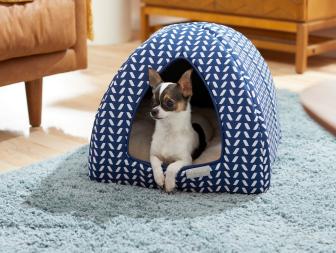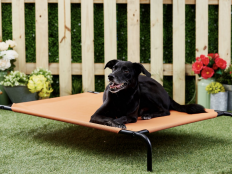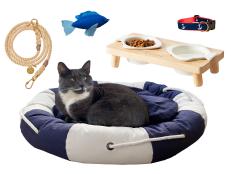How to Calm an Anxious Dog
It isn’t always easy to identify pet stressors, but if Fido seems frightened, learn what options you have to help him overcome anxiety and depression.

Much like humans, dogs show anxiety in different ways and can be triggered by different factors. Separation anxiety and general fear (such as fear of loud sounds like fireworks or thunder) commonly cause other behavioral issues in dogs. Knowing how to calm an anxious dog before it adopts dangerous, hyperactive or destructive habits is important, and understanding what puts dogs at ease is the first step to helping them be well.

Nine OK
How Do I Know If My Dog Has Anxiety?
- He might have a habit of barking or howling when left alone.
- He might present physical indications such as panting, shivering, cowering or pacing.
- He might try to run away, dig excessively or consistently challenge the fencing in your yard.
- He might chew on or destroy furniture and items that are not "his toys" while unsupervised.
- He might show signs of self-harm, such as excessive licking or chewing on fur or paws.
Tips for Calming Anxiety in Dogs
If your pet experiences bouts of anxiety or depression, consider your routine and ways that you can help alleviate symptoms. Training with positive reinforcement can also help reduce recurring anxiety.
“Mild cases of separation anxiety can be addressed with a counter-conditioning program, where, over time and through positive reinforcement, we change the dog’s negative reaction to a situation (being left alone) to a positive one,” says Erin Katribe, DVM and medical director for Best Friends Animal Society. “This is usually achieved through associating the situation with something really positive that the dog enjoys, like really delicious food or engaging toys. It’s also helpful to start the training process by providing these positive items while you’re gone for only a short period of time — the goal is to avoid the fear and negative association all together.”
“For more severe cases,” she adds, “training can be much more complex, and I recommend consulting a trainer or veterinary behaviorist. In severe cases, the dog has so much anxiety that they won’t eat or engage with the toy or food item.”
In any training scenario, be mindful of your own demeanor. Pets can sense your emotions, so it’s always best to try to be a calming influence. “Giving too much attention when leaving and returning home can heighten anxiety in pets,” says Dr. Jamie Richardson, chief of staff at Small Door Vet.

VioletaStoimenova
In addition to making progress with positive reinforcement strategies to help calm your pet, there are a number of other products and practices that can help your pet be a more relaxed companion:
Exercise
Just like with humans, a good workout works wonders. If your dog experiences anxiety, you might want to start by providing more opportunities for exercise. A long walk, trip to the dog park, or game of fetch in your own backyard are just the ticket. Pets who suffer from separation anxiety or simply need more activity during the day to reduce evening hyperactivity can also benefit from doggie daycare or dog sitters.
10 Fun Ways to Exercise With Your Dog 10 Photos
There's no reason to leave your furry friend behind when you're eager to get in a workout.
Provide Physical Contact
In a stressful moment, love and attention from a trusted human can help to alleviate stress in an anxious dog. Dog massages, snuggles and a good brushing can help distract a dog from its triggers and make it easier for them to feel safe and at ease.
Offer Toys
Mentally stimulating toys can provide a distraction for pets experiencing anxiety, hyperactivity and boredom. Chew toys that offer a variety of sensory textures or sounds, and puzzle toys that release treats when operated correctly can provide hours of entertainment. Share these activities with your pets in times of stress, and not only will they distract from their immediate worries, but using them as positive reinforcement for good behavior during a stressful time can help reframe their behavior in the long term as well.
7 Smart Toys You Can Make For Your Dog 7 Photos
Pique your dog's curiosity and encourage mental and physical activity by surrounding him with stimulating puzzles and gadgets, like these entertaining toys that you can make at home.
Play Music
If you can’t be nearby your dog during an anxiety-inducing time, music might be just the ticket to help your dog feel relaxed. You can actually buy calming music, and it helps more than just anxiety, too — many pets also benefit from music to combat loneliness, boredom and hyperactivity. Introduce music as a sensory solution during relaxing and fun times, and you’ll more easily be able to rely on it as a soothing mechanism during stressful events.
Dress Your Pet
Calming coats and anxiety vests are often effective when it comes to comforting anxious dogs. The effect of a tightly fit garment is much the same concept as swaddling a baby. Regardless of brand and design, when the fit of the jacket is right, the snug material provides a consistent pressure to the torso of the dog.
Create a Safe Space
A comfortable dog bed or crate can offer comfort and a sense of safety to dogs experiencing anxiety. If your anxious pet is prone to destruction, a crate can also help keep them safe while you’re away from home.

Hillary Kladke
Try Acupuncture
“Acupuncture can certainly be part of a treatment plan for pets with anxiety,” says Dr. Gary Richter, DVM, medical director of Holistic Veterinary Care and founder of Ultimate Pet Nutrition. “As a rule, it is something that needs to be done regularly. That could mean up to weekly for some pets or as infrequently as monthly or every other month for others. Personally, I usually start with training and supplements first as this tends to be easier on the owner and the animal. If that doesn't work, acupuncture is a good option to look at before moving into pharmaceuticals.”
Consider Medication
Perpetually anxious pets might need more than attention and stimulation, and if all other efforts don’t help, ask your veterinarian about common oral medications. You might even be surprised to learn that CBD solutions are becoming increasingly common for anxious pets, and other over-the-counter solutions might be more mainstream than you think. Your vet will be best able to make recommendations based on your pet’s individual needs.
More Tips for Dog Owners
How to Keep Your Pet at Ease During a Home Renovation
Follow these tips to keep your pet safe while your home’s a construction zone.
How to Modify Your Home for Senior Dogs 10 Photos
Help your older dog feel more comfortable at home with these simple tips.
The 12 Best Dog Beds
For pups who sleep belly up, curled up, sprawled out or on their side, these top-rated dog beds will ensure they get the best rest ever.


















































